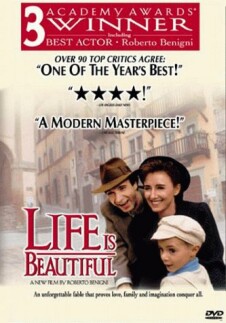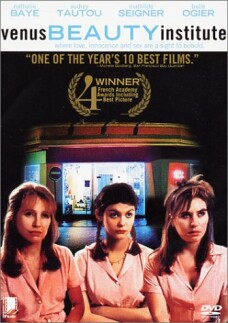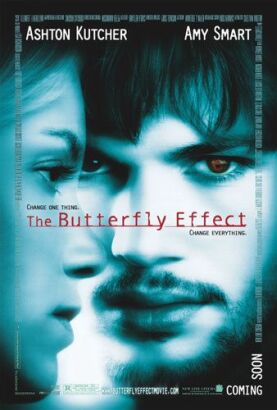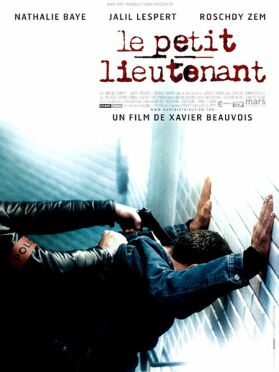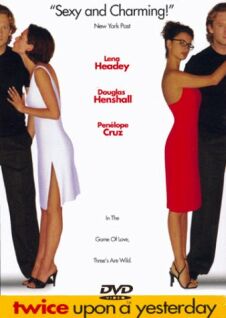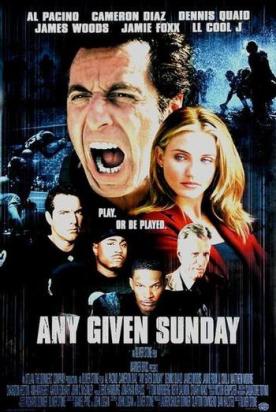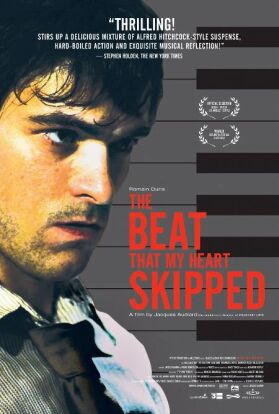Vita è Bella, La (Life is Beautiful)
La Vita è Bella or Life is Beautiful was directed and co-written by Roberto Benigni, who stars as Guido Orefice, a Jewish waiter in Arezzo before the war. He woos and wins his wife, Dora (Nicoletta Braschi), whom he calls la principessa — the princess — in memorably comic and romantic style and manages to keep his spirits up during the first years of the war before being sent off to a German death camp along with his wife, his small son, Giosuè (Giorgio Cantarini) and his uncle. There he employs the same comic ingenuity he used in courting la principessa to persuade adorable Giosuè that the whole thing is an elaborate game in which they are competing with the other prisoners for the first prize of a tank. A real tank. The rules, he tells his son, pretending to translate the gruff German officer’s instructions, are that he must not cry, must not call for his mommy and must not ask for snacks. If he and dad, working together to perform every difficult task the rules require, can amass 1000 points, they will win the tank.
It is such a bizarre project that one expects to be offended but never is, quite. Of course it is rather offensively silly to suppose that a clever papa could thus preserve not only his son’s life but his innocence in the midst of the Holocaust, but the film as a whole is so fantastical that for the moment we have no difficulty accepting it, as an unknown voiceover narrator tells us to do at the very beginning, as a fable. The trouble is that, also like a fable, it tends to produce mere banality — in this case the moral that it is good to keep smiling when skies are grey. Or perhaps even some Norman Vincent peelings to the effect that a good attitude can alter the face of even the grimmest reality. If only the six million who didn’t make it out of the camps had known!
Having said all that, however, I must put on record the fact that I enjoyed this movie quite a lot. Benigni deserves his high reputation among the Italians as an inspired clown, and the first half of the picture, in particular, presents us with an object lesson in physical comedy — one gag follows another, and all are of the highest quality. Guido’s courtship of la principessa is sweet and warm and romantic, and even the gentle satire of fascist earnestness seems to me to work well. In the opening scene, we see Guido and his friend Ferruccio (Sergio Bustric) careering down hill in a car with no brakes. They try to warn a crowd of people waiting for the king to arrive to get out of the way, and the crowd parts because the people think that Guido — whose arm movements attempting to clear them out of the roadway they mistake for a fascist salute — is the king.
You could see it as a kind of metaphor for the whole Italian fascist enterprise — except for the fact that no one is hurt. This is the problem with presenting historical tragedy as comedy — which in many ways it was. You have to leave out too much in order to get the laughs. Guido offers a charming explanation to adorable Giosuè of why a shop says no Jews or dogs allowed: everybody doesn’t like somebody, he says cheerfully. Just down the way there’s a shop where no Spaniards or horses are allowed. A bit further on? No Chinese or kangaroos. In fact, he’s thinking of instituting such a rule in his own little shop. No Visigoths or spiders. Thus the boy’s innocence is preserved — but the rest of us can’t help feeling patronized a little.
Let’s leave it like this: the idea of a heartwarming comedy about the Holocaust is inescapably, by definition — by what the philosophers call analytic logic (for example: two plus two equals four) — an exercise in tastelessness. But if, per impossibile, such a comedy could be made tastefully, Life is Beautiful would be it.
Discover more from James Bowman
Subscribe to get the latest posts to your email.

